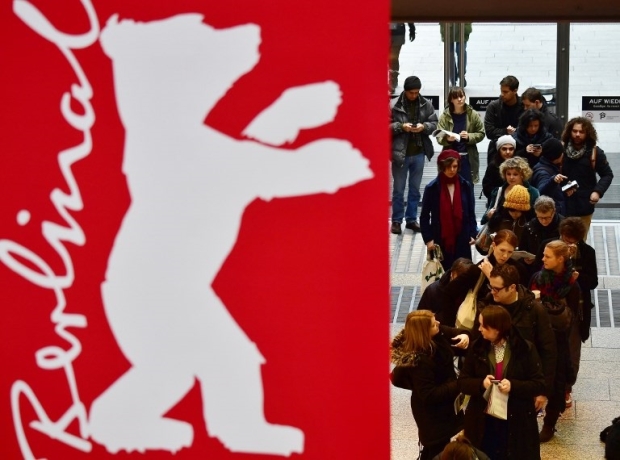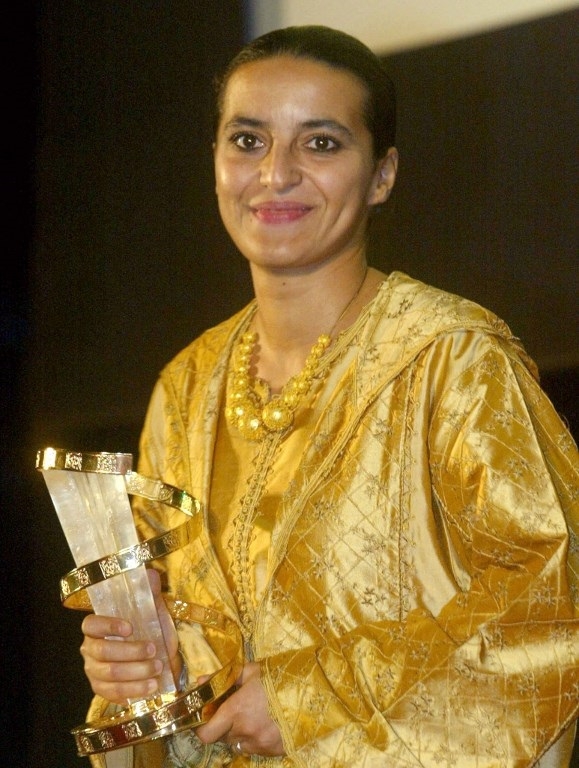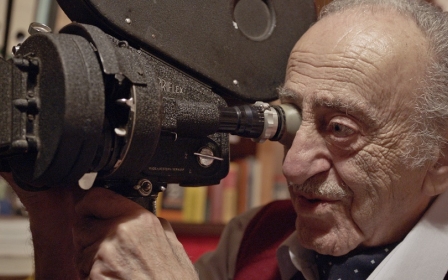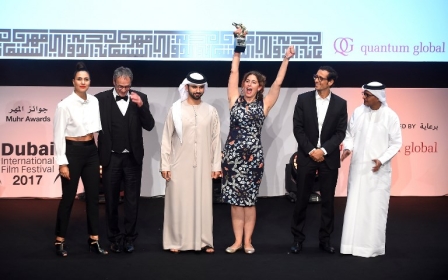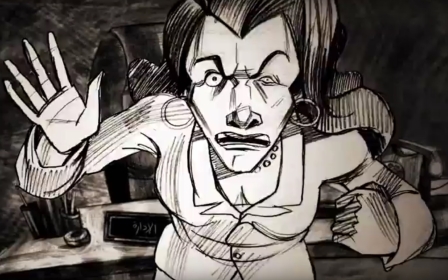Iranian horror adds bite to 2018 Berlin Film Festival
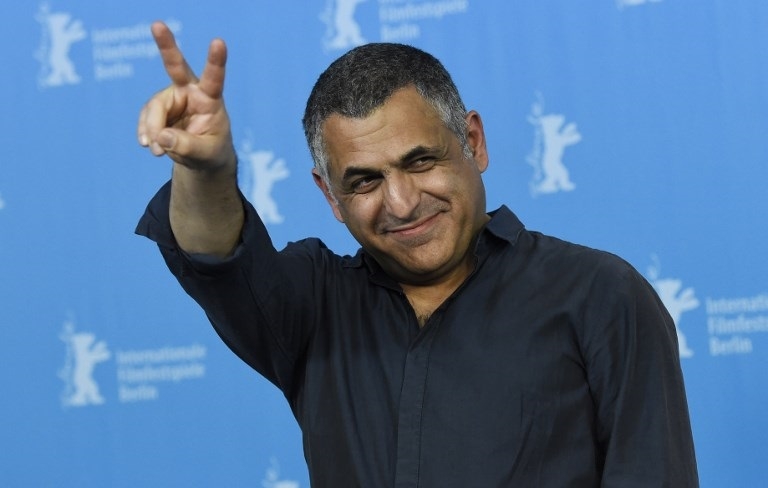
Among the world’s top film festivals, Berlin - also known as the Berlinale - has been the most hospitable destination for Middle Eastern films over the past 20 years.
For an international fair that has always proudly worn its liberal politics on its sleeves, it was only natural that the volatile status of the region would prove to be a substantial attraction for a festival that has struggled over the past decade to compete with Cannes, Venice and Toronto.
The copious sections of the festival have allowed for increasing participation of Middle Eastern films whose numbers have grown significantly after the Arab Spring and the Syrian civil war.
By primarily focusing on familiar tropes that have come to define most Middle Eastern films exported in festivals, many filmmakers were simply content to offer more of the same: stories revolving around wars, the subjugation of women, immigration, culture clashes, poverty, and political oppression.
The political unrest in the region still figures in various titles this year, but a number of filmmakers have employed inventive approaches in their pictures.
Promising films
In exceptional editions like last year’s, a handful of ambitious filmmakers have managed to transcend obligatory politics by creating aesthetically inventive works rooted in universal themes and ideas.
Leading the lot is award-winning Mani Haghighi’s competition nominee Pig, a family-drama-cum-thriller about a serial killer targeting Tehran filmmakers that is certainly the hottest Middle Eastern ticket in the festival.
Although not as popular as Oscar-winner Asghar Farhadi or Cannes favourite Mohammad Rasoulof, Haghighi has established himself as one of Iran’s most original and unpredictable filmmakers working today. This is thanks to a number of atypical, multilayered political allegories such as Men at Work (2006) and A Dragon Arrives! (2016).
Equally original is Iranian film director Shahram Mokri who made a big splash in the festival scene with his one-take horror mystery Fish & Cat (2013). His new offering, Invasion, screening in the Panorama section, is another mystifying curiosity centring on an enigmatic murder whose victim may or may not have been a vampire.
A more traditional fare is Pooya Badkoobeh’s debut feature Dressage, a coming of age story about an upper-class girl attempting to cover up for robbing a kiosk.
Pushing envelopes
North Africa has had a strong presence at the Berlinale over the past decade, and this year is no different. From Morocco, Berlinale regular Hicham Lasri returns to the festival for a third straight year in a row with Jahilya, a multi-character drama surveying a vast array of Moroccan society, executed with Lasri’s distinctive hyper-realistic style.
Ever since his debut The End stormed festivals eight years ago, Lasri has become one of the Arab world’s most prolific filmmakers, finishing films at breakneck speeds and pushing envelopes – both artistically and politically – with every passing picture. He also remains frustratingly inconsistent, and whether his new film is a disposable addition to his expanding cannon or an artistic step forward is anybody’s guess.
Less prolific if equally inconsistent is Lasri’s Moroccan compatriot Narjiss Nejjar who makes a comeback to cinema after a seven-year absence with Stateless, a portrait of an Algerian-born Moroccan struggling to return to her home after being deported in 1975. Touching upon one of the lesser-known chapters in the history of the two North African nations, Stateless is certain to contain Nejjar’s striking sensuality, while the subject matter seems to include the robust substance missing from some of her previous outings.
The Middle East comes alive
In the experimental Forum Expanded section, Ayreen Anastas, from Bethlehem, and Rene Gabri, born in Iran, present An Untimely Film for Everyone and No One, a quasi-adaptation of Thus Spoke Zarathustra by German philosopher Friedrich Nietzsche, set between Algeria, Egypt, Jordan, Lebanon, Morocco, Syria and Tunisia.
Premiering also in the same section is Marina Gioti and Greek-Lebanese filmmaker Georges Salameh’s The Invisible Hands, a chronicle of the collaborative project between maverick underground American-Lebanese musician and ethno-musicologist Alan Bishop with three young Egyptian musicians to translate his songs into Arabic.
Another Arab debut premiering this year is Lebanese filmmaker Reem Saleh’s Egyptian documentary What Comes Around, a panorama of the underprivileged Cairo neighbourhood of Rod El Farrag shot over six years.Turkey is having an unusually low-key presence this year in Berlin, represented only with a couple of features: Banu Sıvacı’s contender The Pigeon, in the Generation category, a tale of a lonely boy finding solace in pigeon breeding; and Burak Cevik’s The Pillar of Salt, a slow-burning mystery tracing a pregnant woman's search for her lost sister.
Western productions
Stories with Middle Eastern themes or plotlines by European and Latin American filmmakers are also on display this year. The most intriguing title of the bunch is Profile, the latest independent production from Russian blockbuster director Timur Bekmambetov (Wanted, Night Watch, Lincoln: Vampire Hunter).
A fact-based thriller, the American-British production, which premieres in the Panorama section, recreates undercover journalist Anna Erelle’s investigation of the recruitment of young European women by the Islamic State group, also known as ISIS. No western production has managed to successfully probe the terror of ISIS, and whether Bekmambetov can upend this trend remains to be seen. He desperately needs a hit after the colossal failure of 2016’s Ben Hur.
Another notable entry is 7 Days in Entebbe, the new action thriller from former Golden Bear Brazilian winner José Padilha (Elite Squad 1 & 2), screening outside of the competition.
The multi-million production dramatises the infamous 1976 hijacking of the Air France flight heading from Tel Aviv to Paris by four militants including two members from The Popular Front for the Liberation of Palestine (PFLP) and two Germans from the left-wing German militant group Baader-Meinhof gang.
The incident was dramatised in the mini-series Carols (2010) by French director Olivier Assayas, but the new film - which is fronted by an impressive cast that includes Oscar-nominee Rosamund Pike and German star Daniel Brühl - promises a fresh take on the event many deem responsible for shaping modern Israel.
Absent topics
Elsewhere, celebrated Brazilian director Karim Aïnouz dives deep into stories of arrival and departure, and refugees preparing for their new German life in the documentary Central Airport THF. German novice Henrika Kull zeros in on the life of German-Middle Easterners in Jibril, a romantic drama about the budding relationship of a single mother-of-three and an inmate.
And Canadian filmmaker Christy Garland directs her camera towards a young Palestinian woman aspiring to be a police officer in the Danish co-production What Walaa Wants.The refugee crisis and rise of the far right was the theme informing the Berlinale competition over the past few years. Whether the subject has already run its course or the festival's committee has caved into negative press, the topic is conspicuously absent from this year’s competition, relegated to the handful of aforementioned entries scattered over the sidebars.
The tropes of Middle Eastern stories are still front and centre in the forthcoming Berlinale edition, but by encouraging different genres and styles, Middle Eastern cinema could finally be regarded and assessed on the strength of its filmmaking and the different forms it takes on, rather than the usual predictable content.
The 68th Berlin International Film Festival takes places between 15-25 February 2018.
Middle East Eye propose une couverture et une analyse indépendantes et incomparables du Moyen-Orient, de l’Afrique du Nord et d’autres régions du monde. Pour en savoir plus sur la reprise de ce contenu et les frais qui s’appliquent, veuillez remplir ce formulaire [en anglais]. Pour en savoir plus sur MEE, cliquez ici [en anglais].


